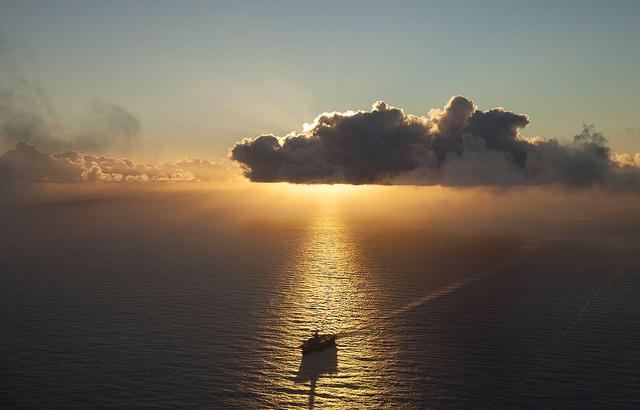
Almost a year ago, Paul Dibb and Richard Brabin-Smith wrote an important ASPI paper in which they acknowledged, for the first time, that China’s growing power and ambition constitutes a major shift in Australia’s strategic circumstances, and requires us to rethink key elements of our defence policy.
Now Dibb has returned to the issue, in a recent talk in which he takes that analysis a big step further by acknowledging, again for the first time, that China’s rise is only half the story.
The other half is about America. Dibb and Brabin-Smith’s paper last year barely mentioned America, but Dibb’s latest speech places the growing uncertainties about US intentions and resolve at the heart of the analysis. Dibb recognises that America is no longer the ally we’ve hoped and expected it to be, and that our defence policy needs to take account of this too.
It is a critical point. As I wrote in response to the paper last year, China’s rise would not require us to change our defence policy much, as long as we were sure that America was willing and able to respond to China effectively. It’s our doubts about that which really require us to think again about what we can and should do to look after ourselves.
That is especially important because over the past 25 years Australia has quietly abandoned the commitment to self-reliance which was the central pillar of our defence policy in the 1970s and 1980s. One can understand why. On the one hand, Australia’s relative strategic weight in Asia has fallen fast over the last few decades, and our technological edge in air and sea capabilities has eroded. Self-reliance has therefore become harder and harder.
On the other hand, America appeared, at least for a time, unchallengeable, powerful and unshakable in its resolve to preserve the US-led order and uphold its alliances. Self-reliance looked less and less necessary, so we slid back into depending on America for our defence. Arguably that dependence is even deeper now than it was at the height of the old ‘forward defence’ era of the 1950s and 1960s.
That makes our current predicament all the more challenging. To really understand today’s defence and strategic challenges, we have to jettison a lot of the assumptions and axioms which have framed our defence policy debates for a generation now, and this is where I think Dibb’s analysis still falls a little short. At many points it still presupposes that America will be there for us, despite the clear acknowledgment elsewhere that we can no longer take this for granted.
The tension is perhaps clearest where Dibb says that he ‘is not one of those who believe that America is about to pull out of Asia’, because that seems to be precisely the risk that he is addressing. So what’s going on here? Perhaps Dibb means that he doesn’t think America will suddenly decide that it no longer wants to be the leading power in Asia. In that case, he’d be quiet right: Americans like being the region’s leading power, and they would not step back from that lightly.
But as China’s power grows—and Dibb does now seem to accept the reality that China’s power has grown and the probability that it will keep growing—the cost to America of resisting China’s ambitions grows too. Whereas once it seemed that America could remain the dominant power in Asia without breaking into a sweat, today it’s clear that resisting China is going to be both expensive and dangerous.
So now the question is whether the US wants to remain the leading regional power enough to pay the costs and accept the risks involved in confronting and containing China. I have argued that the answer is quite likely to be ‘no’, and the case made in Dibb’s speech plainly suggests that he now agrees with that.
If this is right, then the implications for Australia’s strategic and defence policy are even bigger than Dibb portrays. For example, he says that it’s vital that we continue to have access to highly advanced US milit